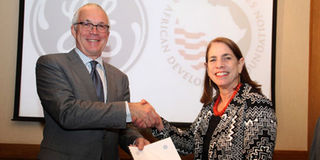US to offer technical support on managing power in Sh1.4trn plan

PHOTO | DIANA NGILA US African Development Foundation president Shari Berenbach (right) with GE Africa boss Jay Ireland on signing a $2 million ‘Off-Grid Energy Innovation Challenge’ in support of the Power Africa plan during a media briefing at the Hotel Intercontinental, Nairobi on July 8, 2013.
What you need to know:
- America says it will seek to accelerate deals in order to get electricity on the national grids as it funds Power Africa initiative
The American government will offer technical assistance to the six African countries chosen for the Power Africa initiative so as to accelerate transactions to get additional electricity to the relevant national grids.
In an interview with the Nation, counsellor for Economic Affairs at the US embassy in Nairobi David Renz also said that Washington, through the project intends to work with African governments to unbundle power distribution functions in an effort to increase energy supply.
“How we accelerate transactions to get power on the grid are some of the issues we will be considering here. We will be looking for ways through which we can mobilise resources within the US government to support power development on the continent,” said Mr Renz.
Power Africa plan was launched in South Africa by US President Barrack Obama during his recent tour on the continent.
Operational framework
The initiative is meant to increase access to electricity in six African countries among them Kenya, Tanzania and Ethiopia.
Weeks after its launch, local power generators including state-owned Kenya Electricity Generating Company (KenGen) said they were yet to get a clear operational framework for implementing the initiative.
The Power Africa Initiative is worth Sh1.4 trillion ($16 billion) of which Sh602 billion ($7 billion) financial support will come from the US government over a period of five years, while Sh774 billion ($9 billion) will encompass investments from the private sector both in form of cash and technical assistance.
In Kenya, only less than 30 per cent of the entire population has access to electricity, a situation similar to that of nations in Sub-Saharan Africa where more than two thirds of the population has no connection to power.
The scenario could get worse for Kenya given that the electricity distributor, Kenya Power, recently doubled its connection fees to Sh70,000 from Sh35,000 — an amount that which is beyond the reach of many people. The higher fees could potentially lock out millions of customers from the national grid.
Since the launch of the initiative on June 30, in South Africa, the project has attracted private investors who have collectively pledged investments to the tune of over $7 billion in power generation projects across the six countries.
Besides offering technical support for development of additional power generation capacities, the US government also intends to use the project as an avenue for developing expertise to resolve tussles related to power production that could otherwise have stalled energy generation.
“One of the ways through which we can work with the African governments is offering technical expertise on how to manage power. We will also explore ways of solving issues as they come up,” said Mr Renz.




